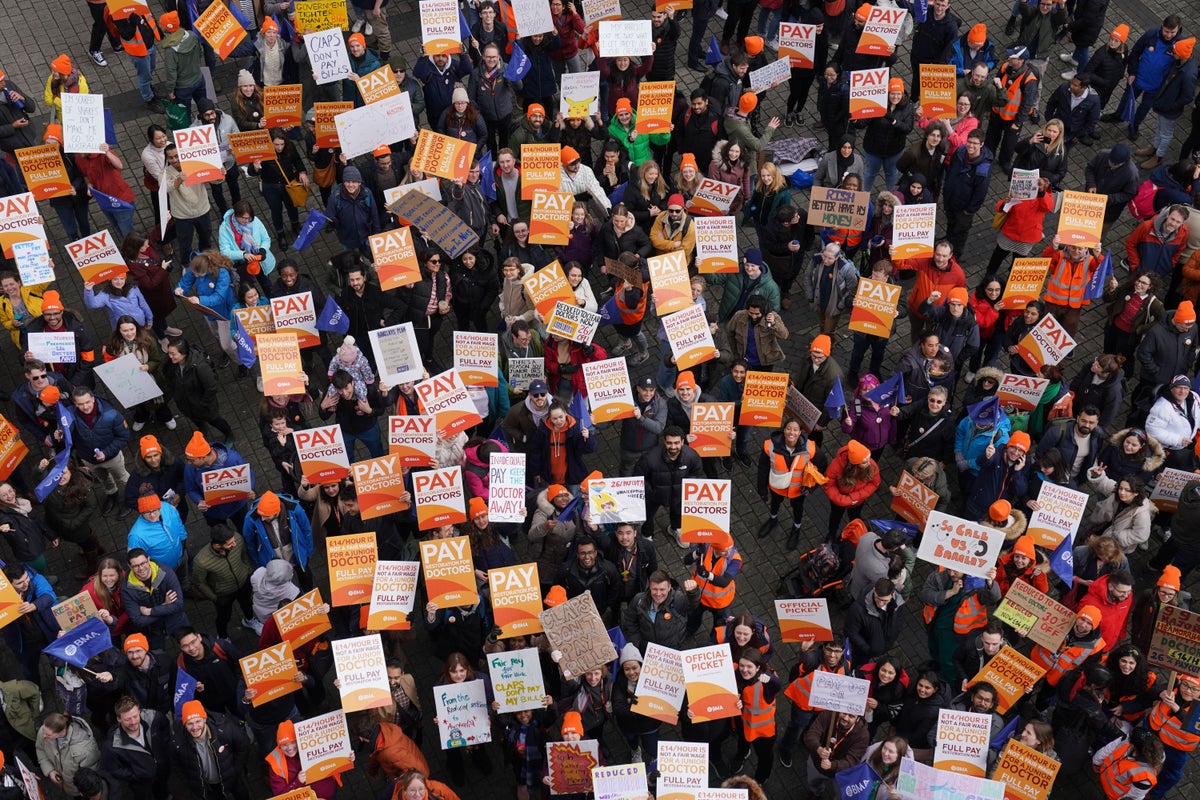
Junior doctors in England are to stage strikes in December and January after talks between the doctors’ union and the government broke down.
Ministers and representatives from the British Medical Association (BMA) have been locked in negotiations for five weeks trying to find a resolution to the pay dispute.
But the BMA said that the Department of Health and Social Care had not been able to put forward a credible offer to end the strikes.
As a result, the BMA’s junior doctors committee has voted unanimously for strikes in December and January, the union said. The strike dates in England are from 7am on 20 December to 7am on 23 December; then from 7am on 3 January to 7am on 9 January.
The news comes after the BMA and the government came to an agreement on consultants’ pay last week. The agreement, which will see most senior doctors get a 12 per cent increase, will need to be voted on but has meant an end to industrial action from senior doctors.
BMA junior doctors committee co-chairs Dr Robert Laurenson and Dr Vivek Trivedi said in a statement: “We have been clear from the outset of these talks that we needed to move at pace and if we did not have a credible offer, we would be forced to call strikes.
“After five weeks of intense talks, the government was unable to present a credible offer on pay by the deadline.”
The BMA originally called for the government to address a real-terms pay cut experienced by junior doctors, which it claimed amounted to 26 per cent since 2008/9.
Other estimates, including one from the Institute for Fiscal Studies, put the loss at 11-16 per cent since 2010.
The junior doctor committee chairs said during negotiations the government offered an additional 3 per cent pay rise unevenly spread across doctors’ grades, which it said would lead to some getting a real-terms pay cut.
They added: “It is a great shame that even though the approach was more constructive, there was not enough on offer to shape a credible deal, which we hoped would end the dispute. The approach from health secretary, Ms Atkins and the team has been productive but ultimately that alone is not sufficient to make up for 15 years of declining pay.”
Without enough progress by the deadline, we have no choice but to take action that demonstrates doctors are as determined as ever in reversing their pay cuts— BMA junior doctors committee
The BMA committee chairs said the government can avoid the future strike actions if a “credible” pay offer was made the day before or during strike action.
Health and social care secretary Victoria Atkins said: “It is disappointing that despite significant progress the BMA junior doctors committee have walked away from negotiations and declared new strikes, which will result in more disruption for patients and extra pressure on NHS services and staff as we enter a busy winter period, risking patient safety.
“I have been clear that I respect the work of doctors in training and want to work with them to settle this dispute. We have agreed a fair and reasonable offer with the BMA’s consultants committee, which is being put to members for vote following constructive talks.”
Ms Atkins said if the BMA calls off strikes it will look to negotiate again.
Health secretary Victoria Atkins talks to the media outside the BBC’s Broadcasting House in London— (PA Wire)
So far more than a million appointments have been delayed due to strike action, while the NHS has estimated it has costs trusts more than £1.3bn.
Sir Julian Hartley, chief executive of NHS Providers, which represents hospitals in England said: “This is the outcome that trust leaders were dreading.
“This will be the longest strike in NHS history during the busiest and toughest time of the year for the NHS. We know this walkout will be especially hard for trusts to manage given lots of staff will have annual leave booked over the festive period.”







